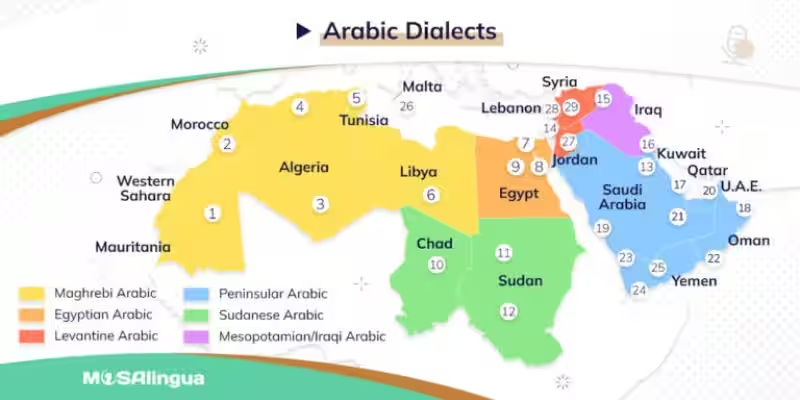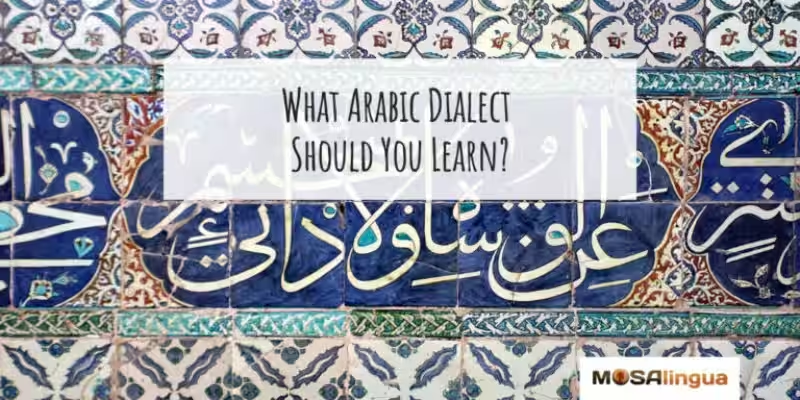
Choosing a dialect of Arabic to learn, especially for someone already fluent in Standard Arabic (Fus’ha), can feel overwhelming. The sheer variety of spoken Arabic forms, each with its own unique characteristics, can be daunting. This article aims to guide you through the considerations and factors involved in selecting the most suitable dialect for your specific needs and goals.
Understanding the Diversity of Arabic Dialects
Arabic, with its vast geographic spread and diverse cultural influences, has evolved into a multitude of spoken dialects. These dialects differ significantly from Fus’ha in pronunciation, grammar, and vocabulary, often making them mutually unintelligible. This diversity is a rich tapestry of linguistic evolution, reflecting the history and culture of different regions. While Fus’ha provides a solid grammatical and vocabulary foundation, its practical application in everyday conversation is limited. Thus, learning a colloquial form of Arabic is crucial for effective communication.
The choice of which dialect to learn is not a simple matter of picking the “easiest” one. “Easiest” is a subjective metric, influenced by your existing linguistic background and learning style. What might seem easier for one learner could present a greater challenge to another. Focusing solely on phonetic similarities is misleading, as grammatical structures and nuances often outweigh pronunciation differences in the overall learning curve.
Factors to Consider When Choosing a Dialect
Several factors play a critical role in choosing the right Arabic dialect to learn. These include:
- Your Goals: Are you aiming for religious texts, cultural immersion, or simply everyday communication? Different dialects are associated with various cultural and social contexts.
- Geographic Focus: Do you plan to travel or interact with speakers from a particular region? Choosing a dialect relevant to your intended geographic area will maximize your communicative effectiveness.
- Existing Linguistic Proficiency: Your familiarity with other languages, particularly those with similar linguistic structures, may influence your ability to grasp different Arabic dialects.
- Learning Resources: The availability of learning materials, courses, and communities dedicated to a specific dialect can significantly impact your learning experience.
Consider these points carefully. A dialect that perfectly suits your needs might require an investment of further study and immersion. A dialect relevant to your plans, for instance, might be essential for effective interaction in a specific region.
Which Arabic Should I Learn: Focusing on Utility and Versatility
The ideal dialect isn’t necessarily the one closest to Fus’ha, or the dialect spoken by the largest number of people. Rather, it’s the dialect that serves as a bridge, connecting you to a wider spectrum of Arabic dialects. This approach allows you to progress beyond a single dialect, building a stronger foundation in understanding the broader linguistic landscape of Arabic.
Consider a dialect spoken in a region where different dialects converge. This might provide a more versatile learning experience, potentially facilitating easier comprehension of other dialects later on. While there’s no single “universal” dialect that unlocks all Arabic dialects, focusing on a dialect with significant connections to other regional varieties can be strategically useful.
Choosing a Central Dialect: Egyptian Colloquial Arabic or Modern Standard Arabic (MSA)?
Two popular choices often emerge: Egyptian Colloquial Arabic and Modern Standard Arabic (MSA). Each offers a unique pathway into the broader world of Arabic dialects.
- Egyptian Colloquial Arabic: Widely spoken and used in media, it offers immediate conversational opportunities, making it a go-to option for practical communication. Its use in various regions makes it a potentially effective starting point for bridging the gap between Fus’ha and spoken Arabic.
- Modern Standard Arabic (MSA): Formal and widely used in official contexts across many Arab nations, MSA provides a foundation in Arabic vocabulary and grammar. It’s essential for understanding religious texts, formal communication, and the broader linguistic structure of Arabic.
The choice between MSA and Egyptian Colloquial Arabic hinges on your intended use of the language. If formal communication is paramount, MSA is recommended. For everyday conversation and cultural immersion, Egyptian Colloquial Arabic might be a more pragmatic choice.
Beyond the Basics: The Importance of Immersion
In addition to selecting a specific dialect, immersion is crucial for successful Arabic acquisition. Immerse yourself in the culture and context where the dialect is spoken.
- Language Courses: Formal language courses offer structured learning and opportunities to interact with native speakers.
- Online Platforms: Numerous online resources, from language exchange platforms to educational websites, can supplement your learning.
- Cultural Exposure: Engage with Arabic media, music, and literature, not just for language learning but for understanding the cultural context associated with the dialect.
Ultimately, the success of your Arabic learning journey hinges on your willingness to immerse yourself in the dialect’s context. Continuous exposure, be it through formal study or cultural engagement, will lead to enhanced understanding and communication skills.
Conclusion: Finding Your Path
The journey of learning an Arabic dialect is a personalized one. There’s no single “right” dialect, only the dialect that aligns with your specific goals, linguistic aptitude, and aspirations. By carefully considering the factors outlined in this article, you can make an informed decision and embark on a rewarding language learning adventure. Remember to seek guidance from language course advisors, consult with professionals, and choose the dialect that best suits your individual needs.
FAQ: Which Arabic Dialect Should I Learn?
This FAQ addresses the challenge of choosing the right Arabic dialect to learn, given a foundational understanding of Standard Arabic (Fus’ha).
What are the key factors to consider when choosing a dialect?
The choice depends on several interconnected factors: your geographic goals, your communicative aims (e.g., religious study, everyday conversation, cultural immersion), and your linguistic aptitude. There’s no single “easiest” dialect; what’s challenging for one learner might be straightforward for another. Phonetic similarity isn’t a reliable indicator of ease; grammatical structures and vocabulary differences often pose more significant hurdles. Importantly, consider how the chosen dialect might connect you to other dialects and enhance your overall understanding of the Arabic language.
If I already know Standard Arabic (Fus’ha), will a dialect be easier to learn?
While Fus’ha provides a crucial grammatical foundation, it’s not sufficient for everyday spoken Arabic. Learning a dialect will be necessary for practical communication. However, the ease of learning a specific dialect is relative to your prior linguistic experience. Some dialects may share more similarities to Fus’ha in structure, but this doesn’t automatically translate to an easier learning curve. The actual learning process will depend on the specific features of the dialect, such as its pronunciation and unique vocabulary.
Is there a “universal” dialect that’s a good starting point for understanding all Arabic dialects?
No single dialect acts as a universal bridge to all others. Dialectal variations are significant, with differing grammatical structures and vocabularies. While some dialects may share common ground, learning one doesn’t guarantee comprehension of all dialects. Focusing on a well-connected dialect, one that bridges multiple regional varieties, can be beneficial but won’t be a shortcut.
How can I choose a dialect that will help me bridge the gap between Standard Arabic and spoken Arabic?
A dialect that occupies a central or transitional position in the spectrum of Arabic dialects might be helpful. Consider dialects frequently used in various regions or across multiple regions, as these often serve as communicative standards within those areas. Identifying a dialect with connections to several other crucial regional dialects can be helpful in understanding the broader dialectal landscape.
What are some practical examples of useful dialects to consider?
Two important examples are Modern Standard Arabic (MSA) and Egyptian Colloquial Arabic. MSA is the official language of many Arab countries and is essential for formal written communication and understanding of formal texts like the Quran. Egyptian Colloquial Arabic is widely spoken and understood across many Arab countries, making it beneficial for everyday communication and exposure to diverse cultural expressions.
What resources can help me learn a particular dialect?
Various resources can assist learning a particular Arabic dialect. Language courses, online platforms offering dialect-specific content, and communities dedicated to particular dialects can provide valuable support. Immersing yourself in the dialect’s cultural context—through movies, music, and interaction with native speakers—is crucial for a deeper understanding and improved communication.
Ultimately, what is the most important factor in successfully learning an Arabic dialect?
The most crucial factor is your active engagement and immersion in the chosen dialect and its communicative context. There’s no one-size-fits-all answer; the best dialect for you depends on your specific goals and interests. A combination of targeted study, cultural immersion, and consistent exposure to multiple dialects will ultimately determine your success.








